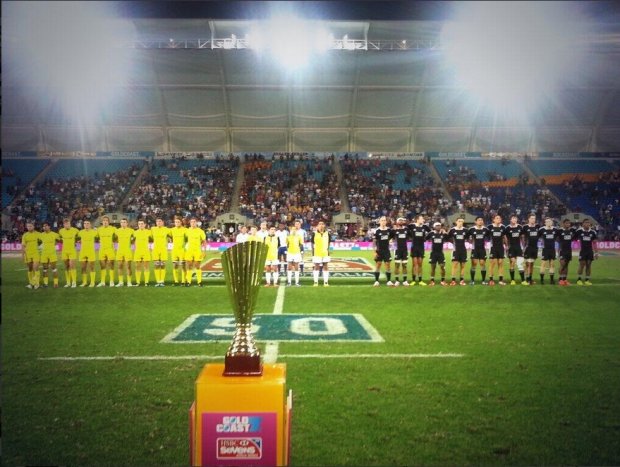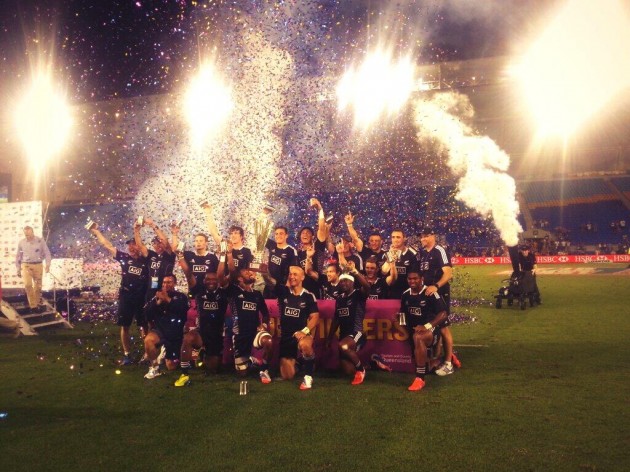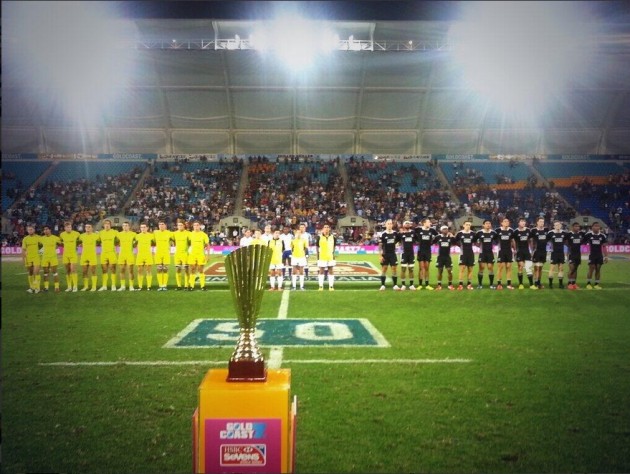Scheduled Website Maintenance
We’re currently in the process of moving to a new and improved server environment. During this transition, the website may experience brief interruptions or temporary outages.
We appreciate your patience while we complete this upgrade. Service will return to normal shortly, with improved performance and reliability.
Thank you for your understanding.
With Series One of the HSBC World Sevens complete, the undefeated New Zealand side return home as the champions while Australia have finished runners up at the Gold Coast Sevens. England and South Africa finished third and fourth.
The Aussies lined up for the first match of the day against Kenya in the scorching Gold Coast heat.
Australia started well, securing a penalty dangerously close to the Kenyan line.
Speedster Shannon Walker took advantage of the set piece opportunity, blazing through a gap to score directly under the posts. Cameron Clark’s successful conversion took Australia to 7-0 after only three minutes.
The Kenyans answered with powerful break from winger Oscar Ouma, followed by a try and conversion from Biko Adema to equal the score.
Patrice Agunda stepped past Aussie captain, Ed Jenkins to put Kenya in front 12-7 going into half time.
Jenkins showed he wasn’t going down without a fight, starting the second half with a 70m try to take back the lead for his team. Clark’s conversion gave the Aussies a two point lead with the score at 14-12.
Only a minute later, Jenkins again secured more points for the Aussies with a final pass to Sean McMahon to push the score out to 19-12.
Nick Malouf sealed the win for Australia, sprinting through a gap in the tired Kenyan defence to make the score 24-12.
Despite two previous missed conversions, Cam Clark made a try-saving tackle to prevent Kenya from scoring in the final minutes of play.
The siren sounded and the Aussies moved through to the semi-final clash against South Africa with a final score of 24-12.
With the roar of home crowd support, Shannon Walker tore down the field and across the line to put the first points on the board for Australia against the South Africans.
A successful conversion from James Stannard gave the Aussies a 7-0 lead.
Con Foley shortly followed with a try of his own, and another Stannard conversion pushed the Aussie lead out to 14-0.
Seconds before half time, South Africa’s Jamba Ulengo recovered his own superb chip kick to score under the posts. A successful conversion narrowed the score to 14-7 at Half time.
Ed Jenkins again displayed his outstanding ability to start the second half firing, finding the gap and recording another five points for Australia.
Jamba Ulengo then answered with another try and more points for South Africa, closing the Aussie’s lead to 19-14.
The crowd moved to the edge of their seats, as impressive footwork from Stephen Dippies secured another try for RSA and equalized the score 19-19.
A yellow card in the final minutes brought to the South Africans down to six men, but the score remained 19-19 at full time.
The first five minutes of extra time saw Australia’s Jesse Parahi and Junior Laloifi gain reasonable metres with the ball, but the score remained 19-19.
After ten minutes of extra time, a yellow card to South Africa and two unsuccessful penalties to Australia, Jesse Parahi managed to break through the defence and score in the corner for Australia.
The Aussies defeated South Africa 24-19, qualifying them for the final against New Zealand in the final match of the weekend.
In between matches, the IRB sevens draw was announced for the next series to be held in Dubai with Australia in Pool B following their fantastic start to the series.
The day’s action continued with debutante player/coach Matt Hawkins and the USA Sevens defeating Portugal 22-0 in the Shield Final.
The Canadians and Frenchmen battled it out for the Bowl Cup in one of the closest games of the weekend. At full time, both teams were tied with two tries and conversions each (14-14) with the match entering extra time to declare a winner. In sudden death, France secured the Bowl Cup with a try from Julien Saubade.
Fiji were announced as the Plate final winners following their convincing 36-0 win over Kenya.
South Africa and England faced off against one another for third place. England dominated the game, the final score being 47-0 with a total of seven tries.
The Final
The boys in green and gold lined up to take on New Zealand in the final 20 minutes of play for the weekend.
Ed Jenkins started with unbelievable aggression and after only 90 seconds of play, scored in the corner, putting the first points on the board for Australia.
An unsuccessful conversion was recovered by James Stannard who scored under the posts and converted his own try, taking the score to 12-0 for the Aussies.
The New Zealanders then came racing back with a 60 metre try from Ambrose Curtis, and a phenomenal sideline conversion from Tomasi Cama to secure seven more points for the Kiwis.
Curtis then replicated his previous corner try securing another five points for New Zealand with Cama again converting to give New Zealand the 14-12 lead heading into halftime.
With ten minutes left to play, the New Zealanders showed their conditioning as Cama scored under the posts and converted. New Zealand 21-12.
espite leading try scorer Tim Mikkelson leaving the field due to injury, Waisake Naholo scored from what was thought to be a dead ball. Another try to expanded New Zealand’s lead to 26-12.
New Zealand then showed their experience with Joe Webber adding another five points to the score and and a successful conversion from Cama taking the score to 33-12.
Determined to leave everything out on the field, Aussie Cameron Clark stepped through the New Zealand defence to score under the posts, and convert his try bringing the Aussies’ score up to 19-33.
One final try and conversion from New Zealand brought the final score to 40-19.
The Aussies’ display could only be described as impressive, brave, and determined not to give up, reflected by with captain Ed Jenkins being named as Player of the Tournament.
Series twoof the HSBC World Sevens will be held in Dubai on November 29 – 30.



